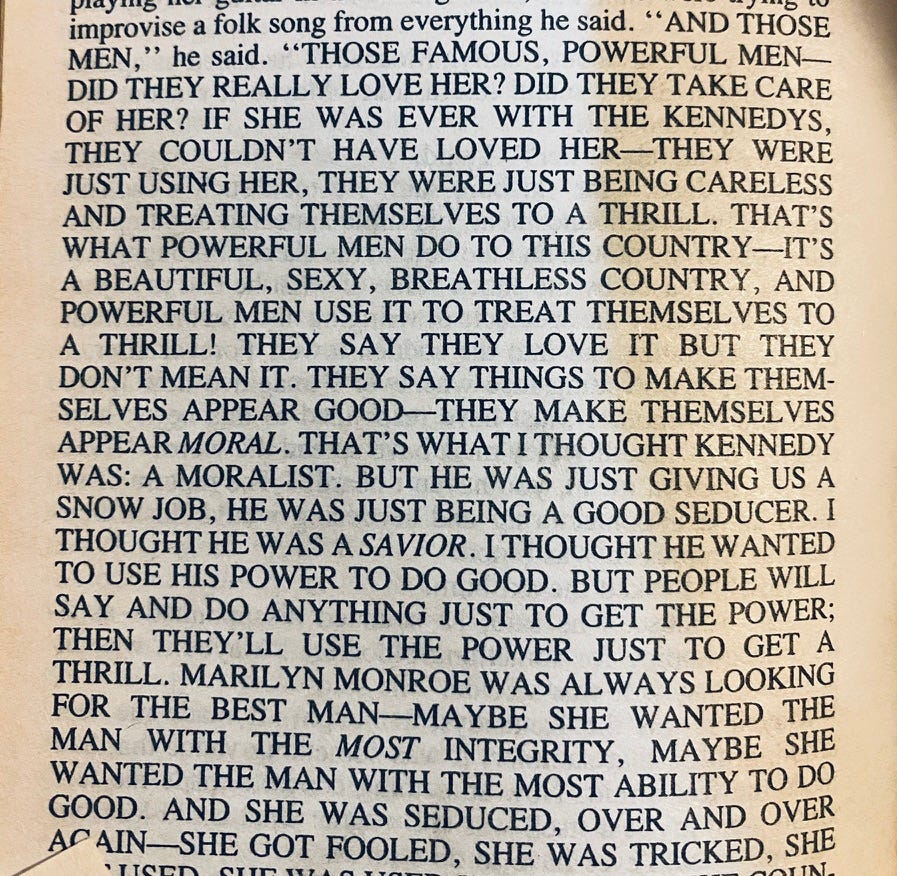You Can Almost See The High-Water Mark
That place where the wave finally broke and rolled back.

The first year that I lived in Seattle, I taught Adult Basic Education courses at a literacy non-profit. I was employed by AmeriCorps, which puts people into community-oriented jobs and pays a stipend rate, usually designed to match the poverty level of the area where the person is placed. They call this being a “volunteer,” but I worked 40-42 hours a week, for which I was paid the princely sum of $1,155 per month. (Because this was a stipend and not a wage, I also qualified for the full food stamps benefit each month, which in 2013-2014 was…$189.)
One of the reasons I felt this decision was worth it, besides the fact that it allowed me to work in a field I liked and believe I was making a difference, was the “education award” that AmeriCorps volunteers get at the end of their year of service if they have met the hours requirement: $5,500 towards either your student loans or your continuing education. That amount would wipe out more than half of the principal I owed, so it was an easy choice to make.
The one problem: there was no infrastructure to support volunteers—many of whom, like me, had our first “real job” through the program—through what came next. See, you never actually get a hold of that $5,500. You just tell the National Service Trust which loan provider to send it to. So in my calculations at the end of the year, that money didn’t factor into what I thought I had made (especially since my AmeriCorps stipends weren’t taxable), meaning I didn’t report it to the government. Fast forward a few months and I got an ominous notice from the IRS informing me that I had cheated on my taxes and owed them $1,500 for failing to disclose that income.
By that point I was making $2,100 per month at the same non-profit, having been hired on as staff after my AmeriCorps term ended. Given the cost of living in Seattle, which can be generously described as “exorbitant,” you can guess the state of my savings at that point in time. It was a lean five months as I scraped up enough money to pay that all back.

You can probably also guess where I’m going with all this. The New York Times published their massive exposé on Donald Trump’s taxes this week, in which it was revealed that he paid just $750 each year for 2016 and 2017. In other words, the exact same total that I paid for an honest mistake at the age of 23 when my bank account was in the red and I was subsisting on food stamps. The fine details of my story might be unique, but the broader picture is near-universal: everyone reading this almost certainly paid the government more than that across those two years.
How did this happen? How is it that a man who is by all accounts a dullard disinterested in everything but himself pull off such a masterful series of obfuscations, reallocations, and clever tricks to get away with doing that?
The truth of it is that it probably wasn’t him making any of these calls, save for the final authorization that allowed a network of accountants and advisors to go ahead with these machinations. The actual explanation is far less sexy: that the tax system, like every other system in this country, is designed to be used and exploited for the gain of the ultra-wealthy at the expense of regular people. Trump is unique for his personal grotesquerie, not for the nature or scope of his crimes; every American billionaire performs variations on these same themes.
(Hey, remember the Panama Papers? Did you know that the Maltese journalist at the fore of exposing those decades’ worth of financial crimes around the world was killed by a car bomb? Probably unrelated. Probably also a non-issue that those documents aren’t still front-page or even back-page news in America.)

A Prayer for Owen Meany, by John Irving
Amidst all of this I continue to be frustrated by the distillation of liberal politics into an exercise of pure fact-checking. It has pervaded everything in recent years. Trump’s presidency is the most obvious example; there’s a whole “journalistic” enterprise dedicated to rating the veracity of his speeches and statements, for which he is assigned a number of “Pinocchios” to show how deceitful he has been. This is at a Very Serious Newspaper whose work we are supposed to respect. But it’s not just Trump—liberal outlets and their unpaid junior partners over at the Instagram Story Factory are more dedicated to this than seemingly any other political project. A recent example that comes to mind: a series of pastel Instagram slides I saw fact-checking the claim that Breonna Taylor’s boyfriend was actually responsible for her death because he had shot back at the police.
A fact check! As if any of the people arguing that this innocent woman deserved to die just didn’t have enough information about the situation! As if they give a shit! What’s that old saw about how you shouldn’t wrestle with a (no pun intended) pig? Something about how you both get dirty, and the pig actually likes it?
I’m not being glib here, I genuinely want to know: Has anyone that you know who is firmly in the grasp of harmful, baseless political or cultural beliefs ever changed their mind based on you telling them that they have their facts wrong? Because somehow I doubt it. Sad and scary to contemplate as it is, no one ever casts aside a whole culture and mode of thinking just because someone points out that they’re wrong. So I begin to question the point of any of these exercises, beyond the fact that they let the people doing them feel good and secure in their rightness.
Politics is about power, not truth. And I see my liberal friends failing to learn this lesson over and over again, and it makes me even more worried about what’s to come. The Democratic Party is the antagonist waving around the fancy sword. Donald Trump is Indiana Jones with a gun. And if Democratic voters were in the movie I guess they’d be the spectators to the fight complaining that Indiana Jones shouldn’t have been able to use the gun while their guy was already dead on the ground.
If being right was enough, we’d have already won.
The enemy wants nothing more than to laugh at you…Because the people, the workers, they prefer the enemy to you. They believe him. They understand him when he speaks. They don’t understand you. And maybe you are right! Maybe you can ask your children to write that on your tombstone: “He was always right — but no one ever knew.”
That’s Pablo Iglesias, leader of Spain’s Podemos party, speaking. And while he was addressing a group much further to the Left than any American party, there are lessons to be found there even for those who are not committed revolutionaries.

Part of the reason for this point being necessary was articulated well by Matt Christman recently during a guest appearance on the always bizarre, often illuminating podcast Death is Just Around the Corner. What he said was this: “The spectacle has overwhelmed everything, including actual experience.” The pace of our news cycle and the very visible degradation of American norms (and, I would argue, the erosion of belief in American greatness in anyone but the zealous) has tricked many liberals into believing that they need to be a pundit and a political strategist, the perfect civic being, well-versed in everything from case law to obscure Acts and Doctrines that no one has had to care about in a few centuries. If I had a dollar for every person I talked to during the primary cycle who told me some version of “I wish Bernie could win, and he’s my favorite of the bunch, but if he gets the nomination the Republicans will make the whole election about socialism and we’ll lose”…well, I would have had at least another $27 donation to give to Bernie.
If we continue to abide by the very narrow boundaries prescribed by this country’s political elite, they will keep winning and the rest of us will keep losing, and believing that we can’t ever get what we want will continue to be a self-fulfilling prophecy. The idea that we can win enough hearts and minds to make the world better simply by being correct is pure fantasy. On that same podcast they make reference to this strength of belief as being emblematic of the same cultural and political tendencies that Hunter S. Thompson wrote about in the famous “wave speech” from Fear and Loathing in Las Vegas. It’s the place in the novel where the character “Raoul Duke,” Thompson’s self-insert protagonist, is sort of brushed aside, and it reads as Thompson himself speaking clearly to the reader.
Maybe it meant something. Maybe not, in the long run…but no explanation, no mix of words or music or memories can touch that sense of knowing that you were there and alive in that corner of time and the world. Whatever it meant…
My central memory of that time seems to hang on one or five or maybe forty nights—or very early mornings—when I left the Fillmore half-crazy and, instead of going home, aimed the big 650 Lightning across the Bay Bridge at a hundred miles an hour wearing L. L. Bean shorts and a Butte sheepherder's jacket…booming through the Treasure Island tunnel at the lights of Oakland and Berkeley and Richmond, not quite sure which turn-off to take when I got to the other end (always stalling at the toll-gate, too twisted to find neutral while I fumbled for change)…but being absolutely certain that no matter which way I went I would come to a place where people were just as high and wild as I was: No doubt at all about that…
There was madness in any direction, at any hour. If not across the Bay, then up the Golden Gate or down 101 to Los Altos or La Honda…You could strike sparks anywhere. There was a fantastic universal sense that whatever we were doing was right, that we were winning…
And that, I think, was the handle—that sense of inevitable victory over the forces of Old and Evil. Not in any mean or military sense; we didn’t need that. Our energy would simply prevail. There was no point in fighting—on our side or theirs. We had all the momentum; we were riding the crest of a high and beautiful wave…
So now, less than five years later, you can go up on a steep hill in Las Vegas and look West, and with the right kind of eyes you can almost see the high-water mark—that place where the wave finally broke and rolled back.
When I was getting really into HST back in college this part of the book put a lump in my throat every time I read it, which was often. I would pull Fear and Loathing down from the shelf and flip to those dog-eared pages on long, frenzied nights and read those words again and again, feeling like if I just reached hard enough I would grab that same energy and sense of purpose.
What should have occurred to me then and didn’t was that I always ignored the final sentence, the one that would have punctured the balloon if I had let it.
Maybe that’s okay anyway. Maybe you have to be given a taste of all that universal energy and righteousness so that you’re even willing to try—I don’t know if anyone would work to make the world better if all they could see was the high-water mark from a safe distance. That madness has returned in fits and starts throughout my adult life as my sense of what it will take to fix the world has changed. It’s what sent me in and out of homeless encampments throughout 2017, doing support work; it’s what sent me, an anxious wreck, door-to-door to campaign for Medicare for All in 2018; it’s what sent me to Iowa to canvass for Bernie Sanders in 2020. Those efforts each ended in humiliating defeat and a greater sense of disgust for the small handful of people who have pillaged the earth and cast everyone else aside—but I think that also made them worthwhile. Maybe you have to find the balance between taking enough lumps to learn better lessons and not taking so many that you give up completely.
But I also know now that that relentless, frenzied energy is not enough on its own. It can never be enough. Christman summarizes:
I think part of it is a consequence of our inability to imagine collective action, which is another defining characteristic of America relative to other countries, which means that all we have left is our will—not our will to do, but our will to believe.
That puts a bow on what I’ve sort of been dancing around here, which is simply that continuing to act individually within these narrow, polite constraints will never work. It’s collective power or nothing—and right now the dial is firmly at “nothing.” It is an uncomfortable truth to learn that you by yourself are not enough to meet the challenges of this world, but it’s one that we’re all going to have to remind ourselves of over and over again regardless of who wins in November. You have to join up, you have to put your shoulder to the wheel, you have to get organized, all of which requires sacrifice. There are of course no guarantees that the first place you start putting your time and energy and money into will be the one that makes all the difference—but you also have to be willing to take that chance.
All I really know is that getting organized is the only thing that has ever made me feel less hopeless. For me, it’s been the Democratic Socialists of America and my union, and I fully recognize that those choices won’t be for everyone—especially given the state of union density in this country. But if you’re interested in either of those things, DSA or joining/starting a union at your workplace, please reach out to me, because I’d love to talk to you about that. And if you’re already ready to join DSA and were just waiting for a nudge…
Alright that’s enough of a rant for today, I think. I’ll talk to you all soon.
-Chuck
PS: If you want to support this newsletter, which is free and always will be, why not subscribe?




I am reminded of what our 73-year-old Indivisible group leader told me recently, speaking of his years as a lay missionary in El Salvador -- he got out before the worst of the atrocities. He told me of another missionary, a nun, who he admired greatly. He asked her the purpose of her missionary work there, amid kidnappings and murders. Her response: To show people the power of organization.